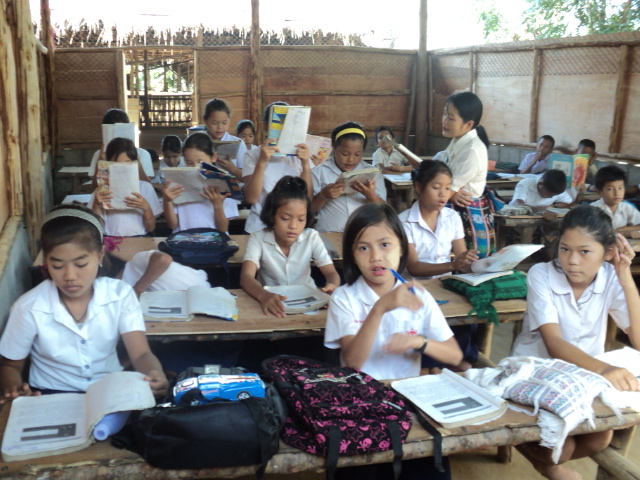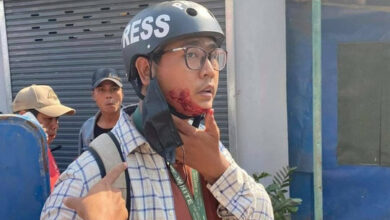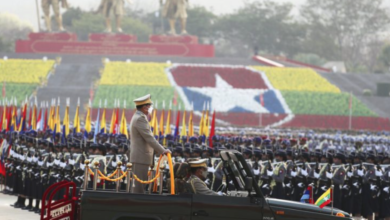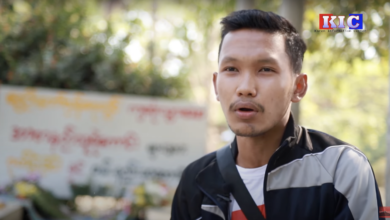Budget cuts force teachers out

Budget cuts affecting an educational INGO that operates in seven refugee camps along the Thai-Burmese border have put additional burdens on refugee families struggling to provide for their children’s schooling.
An official at ZOA Refugee Care Thailand, a Netherlands-based NGO, said the organization faces severe funding cuts from major European donors that will affect the group’s support for teacher salaries in the camps.
ZOA has provided support for refugees from eastern Burma since 1997 to help improve community education within the refugee camps.
The official, who asked not to be named, said ZOA donors do not provide direct funding to pay for teacher salaries but rather give tuition fees for each student that support the salaries of camp teachers.
Last year, ZOA paid 365 baht per student each month to fund salaries for teachers, who earned from 600 to 800 baht per month, the official said.
Naw Deborah Htoo, director of the Karen Refugee Committee Education Entity (KRCEE), said teacher salaries will drop this year more than 50 percent.
“Because of the budget cut from ZOA, students will receive only 92 baht each to pay for their studies.”
This effectively drops teacher salaries to between 200 and 300 per month, she said.
KRCEE, which overseas education in the seven Karen border camps, said that 38,828 students attended classes last year, taught by 1,685 teachers.
The group has discussed ways to help teachers supplement their incomes in view of the budget cuts but has found no alternative to charging tuition fees from students.
This academic year, primary school students will be required to pay 100 baht for the year, while high school students will be required to pay 300 baht, Naw Deborah Htoo said.
Naw Mu Kyaw, a mother of four living in Mae La refugee camp, said she will be forced to borrow money from friends to cover the cost of tuition for three of her children in primary school.
She said her eldest son has been forced to leave the camp to collect bamboo to sell.
“Going outside the camp is dangerous for my son. He could be arrested by local authorities at any time.”
In March this year, a senior Euopean Union official, during a visit to Mae La refugee camp, confirmed that the EU was considering reducing annual aid budgets to refugees from Burma.
Ms Kristalina Georgieva, the European Union Commissioner for International Cooperation, Humanitarian Aid and Crisis Response, told camp committees that a European humanitarian aid budget of €8 million will be allocated to refugees from Burma living in border camps in Thailand.
The EU has supported the Thailand refugee camps since 1995 and is the largest donor.
KRCEE’s director, Naw Deborah, explained that INGOs main priorities in the refugee camps are – food, shelter and health and education is a distant fourth.
Naw Hsi Hsa Paw, works as a camp coordinator under the KRCEE structure in Umphiem refugee camp and explains that because of a lack of funding for teachers it is now getting critical.
“If we don’t supplement teacher salaries by increasing fees from parents many teachers will leave – they won’t be able to support their families.”
Naw Hsi Hsa Paw says.
“Teachers salaries, compared to other NGOs jobs in the refugee camps, is already low, many teachers have left or are looking to train as medics or to find a better paid NGOs work.”
Naw Khin Min Na a primary school headmistress from Tham Hin camp confirmed teachers are leaving.
“Many teachers have difficulties supporting their families, some have already left. They see what NGOs pay their staff in the camp and they compare with what teachers are paid and they realise they are paid a lot less – this year we will get only 250 baht a month – many more teachers will leave.”
Naw Law Ba Htoo, a former teacher at Than Hin refugee camp, agrees.
“I left teaching to work at the Catholic Office for Emergency Relief and Refugees. Teacher salaries are small. I had to look after my children and my expenses were higher than my salary.”
Naw Law Ba Htoo says she is better off working with COERR than being a teacher.
“Here I can also bring my children to work. When I was a teaching I got 690 Baht. Here I earn a minimum of 900 baht. My children already ate my monthly salary before I was paid.”
Naw Deborah is worried the education system in the Thai-based refugee camps is now in a position of being a ‘caretaker’.
“Some refugee camps schools have become “nursery schools” because of the teacher shortage not much teaching is being done, it is child-minding.”
Naw Deborah says at Tham Hin camp there are cases where students are being asked to be teachers while they are still studying. She says the lack of qualified teachers is also the result of 2006 resettlement program where many skill refugees such as teachers went to a third country.
“Now the education quality in refugee camp has declined by 60%, but while 40% is still quality we must strive to maintain it.”




